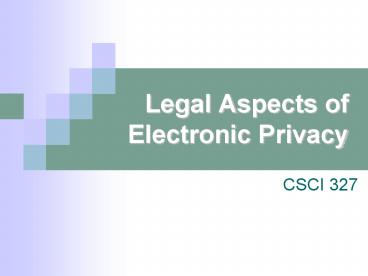Legal Aspects of Electronic Privacy PowerPoint PPT Presentation
1 / 15
Title: Legal Aspects of Electronic Privacy
1
Legal Aspects of Electronic Privacy
- CSCI 327
2
Is your right to privacy protected by the U.S.
Constitution?
- No. Well, maybe. ...
- 1st Amendment
- Congress shall make no law respecting an
establishment of religion, or prohibiting the
free exercise thereof or abridging the freedom
of speech, or of the press or - 14th Amendment
- No State shall deprive any person of life,
liberty, or property, without due process of law.
- 9th Amendment
- The enumeration in the Constitution, of certain
rights, shall not be construed to deny or
disparage others retained by the people.
3
4th Amendment
- The right of the people to be secure in their
persons, houses, papers, and effects, against
unreasonable searches and seizures, shall not be
violated, and no warrants shall issue, but upon
probable cause, supported by oath or affirmation,
and particularly describing the place to be
searched, and the persons or things to be seized.
4
Olmstead v. United States
- Olmstead ran a bootleg operation
- prohibition officers tapped his phone via the
basement without a warrant - they did not enter his apartment
- in 1928, Supreme Court ruled Olmstead's rights
were not violated
5
Federal Communications Act of 1934
- illegal to intercept and reveal wire
communications without a warrant - FBI still wiretapped phones during WWII for
national security purposes
6
NSA
- Starting during WWII, the Signal Security Agency
monitored all telegrams entering and leaving the
US - The program was later used to
- fight organized crime
- war on drugs
- monitor anti-Vietnam war groups
- NSA ended the program in 1975
7
Katz v United States
- without a warrant, police placed a bug on the
outside of a public phone booth used by Katz to
make illegal bets - In 1967, the US Supreme Court ruled Katz's rights
were violated. - Katz reasonably thought his conversation was
private, hence the recording was an illegal
search and seizure - the 4th amendment protects people, not places
- the 4th amendment governs seizure of tangible
items, as well as recording of oral statements
8
Wiretaps
- 1968 - Crime Control and Safer Streets Act
- wiretap warrants require probable cause
- annual report of wiretaps submitted to congress
- 1972 - US Supreme Court
- warrantless wiretaps illegal, even regarding
national security - 1994 - Communication Assistance for Law
Enforcement Act - telecom companies must design their digital
systems to be tap-able
9
Electronic Communications Privacy Act
- enacted in 1986
- ECPA was an amendment to Title III of the Omnibus
Crime Control and Safe Streets Act of 1968, which
was primarily designed to prevent unauthorized
government access to private electronic
communications. - Title I of ECPA protects electronic
communications while in transit. - Title II of the ECPA, protects messages stored on
computers. - Title III prohibits the use of pen register
and/or trap and trace devices to record dialing,
routing, addressing, and signaling information
used in the process of transmitting wire or
electronic communications.
http//en.wikipedia.org/wiki/Electronic_Communicat
ions_Privacy_Act
10
Patriot Act
Uniting and Strengthening America by Providing
Appropriate Tools Required to Intercept and
Obstruct Terrorism (USA PATRIOT)
- allows officials to track emails without showing
probable cause - allows roving surveillance for intelligence (not
just crime investigation), tapped device does not
have to be owned by the suspect - search warrants no longer have to be served
- warrants for records do not require probable
cause
11
Patriot Act Contents
- Numerous amendments to existing laws
- E.g. FERPA
- Universities may supply student info to law
enforcement without student consent or
notification - requires warrant related to terrorism
- Monitoring of Foreign Students
12
Question
- Your Analysis?
- does the government have too much or too little
ability to conduct surveillance
13
Workplace Privacy
- you don't have many workplace privacy rights
14
Export of Encryption Technology
- As of January 2000
- Encryption products with less than 64-bits are
freely exportable. - "Retail" encryption products are widely
exportable to all but certain "terrorist" nations
though still subject to a government review and
reporting requirements. - Non-retail products are also exportable, subject
to similar requirements, to most non-government
users. - Some non-proprietary source code is exportable to
most countries after notice to the government.
15
Debate - Tuesday Feb 17
- Format
- 5 minute opening statements from each group
- alternating 5 questions from each side
- 5 minute concluded statements
- Grade based on quality of arguments
- everyone in the group receives the same grade
- everyone must participate
- Recommendations
- do research
- assign specific people for
- opening statement
- questions for opposition
- answers to questions from opposition
- closing statement

